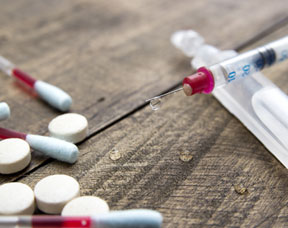Hormone therapy or androgen deprivation therapy (ADT) as it is also commonly known is a prostate cancer treatment designed to reduce the male hormone called androgen in the body and prevent any adverse effects they may have on cancerous cells. Androgens in the body are primarily produced in the testicles and the most common androgen produced is testosterone. Androgens are also produced in the adrenal gland however in smaller amounts. Prostate cancer cells are dependant on androgens which stimulates their growth and to spread within the prostate gland. Hormone therapy essentially eliminates the supply of testosterone to these cancerous cells causing them to die or develop at a reduced rate. Hormone therapy for prostate cancer may involve the use of different types of medications or surgery.
Medications
This form of hormone therapy can be done with one or several types of medications. Theses medications include:
Anti-androgens: Are oral medications often used in conjunction with orchiectomy, LHRH analogs or LHRH antagonists. They block testosterone from reaching the cancerous cells in the prostate gland.
LHRH (luteinizing hormone-releasing hormone) analog: Is a medication that is injected or implanted underneath the skin that works by lowering the amount of testosterone produced by the testicles.
LHRH antagonists: Is similar to the LHRH analog and administered in the same way. The difference is that this particular hormone therapy also lowers the amount of testosterone produced by the testicles just at a more accelerated rate.
Surgery (orchiectomy) An orchiectomy is the surgical removal of the testicles. This procedure is done to stop male hormone testosterone from being produced, which will either slow or completely stop the continued growth of the prostate cancer. Orchiectomy is an outpatient procedure and generally no further hormone therapy is required afterwards. For patients wanting to maintain the physical aesthetic of their groin area, they can opt to have prosteic tescticles implanted.
Side Effects Of Treatment
Any side effects you may encounter as a result of hormone therapy will depend largely on the kind of treatment you are undergoing. Many of these side effects will occur as a result of the decrease of testosterone in the body. Prolonged use of hormone therapy medications may also increase your chances of developing any of the side effects listed below:
- Fatigue
- Hot flashes
- Weight gain
- Nausea
- Difficulty with memory and concentration
- Osteoporosis (bone thinning)
- Erectile dysfunction
- Diarrhea
- Muscle loss
- Depression
Dealing With Side Effects
Your doctor can educate you on the side effects most common with the specific treatment you will undergo. Your doctor may also prescribe certain medications to relieve side effects in addition to suggesting other techniques to help you further manage symptoms. Notify your doctor as soon as you begin experiencing any side effects.


